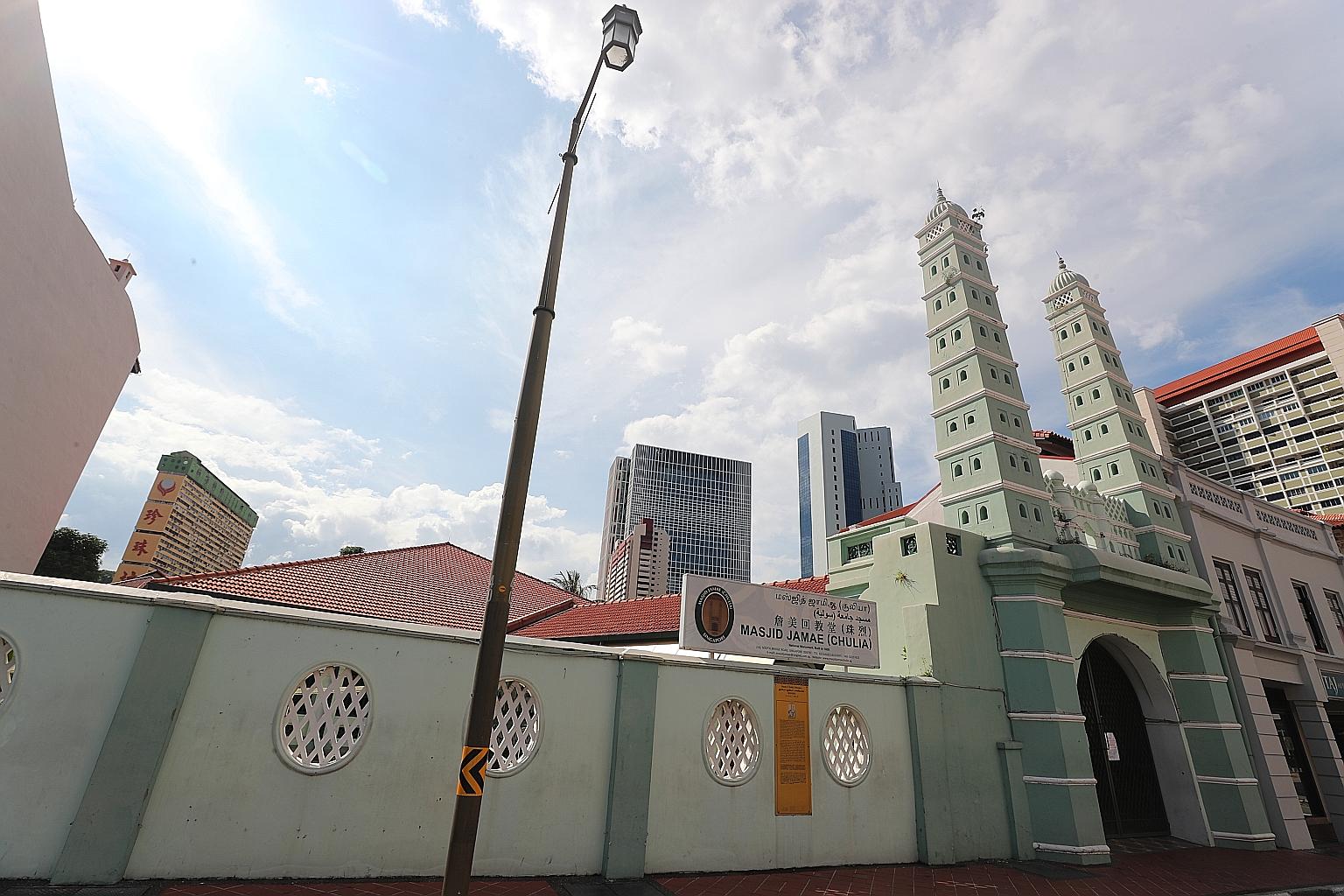Coronavirus pandemic
Safety measures will still be needed after June 1: Masagos
Minister cautions against large gatherings, close contact during Hari Raya celebrations
Sign up now: Get ST's newsletters delivered to your inbox

Masjid Jamae (Chulia) in South Bridge Road, one of Singapore's 70 mosques which have been closed to curb the spread of the coronavirus. Minister-in-Charge of Muslim Affairs Masagos Zulkifli applauded the Muslim community for responding proactively and quickly to the actions that had to be taken to lower infections of Covid-19, even if it meant making drastic changes to its way of life.
ST PHOTO: TIMOTHY DAVID
Life cannot go back to normal straight after the circuit breaker lifts and safety precautions must still be observed to stop the spread of Covid-19, said Minister-in-Charge of Muslim Affairs Masagos Zulkifli yesterday.
Addressing concerns on how the end of the circuit breaker period on June 1 would fall a week after Hari Raya Aidilfitri, which is usually celebrated over a month, Mr Masagos cautioned Muslims against gathering in large groups and embracing each other, as is customary during the month.
Much is still unknown about the coronavirus which causes Covid-19, and the Government will be taking advice from medical professionals to decide how life after the circuit breaker period will be like, he said.
"But clearly, whatever we do, we should not have big gatherings, we should not have intense interactions, which, unfortunately or fortunately, is what is prevalent in Asian communities like ours."
Ending the circuit breaker too early or not taking adequate measures after it ends could result in a second wave of infections, he warned.
He cited the example of Hokkaido in Japan which had to issue a second state of emergency 26 days after it lifted its first one.
Prime Minister Lee Hsien Loong had also touched on this on Tuesday, when he announced the extension of the circuit breaker from May 4 to June 1.
The circuit breaker measures, meant to choke the spread of the coronavirus, will now cover the whole of the Muslim fasting month of Ramadan, which begins tomorrow, as well as the first week of Syawal. Hari Raya Aidilfitri on May 24 is the first day of Syawal.
Mr Masagos applauded the Muslim community for responding proactively and quickly to the actions that had to be taken to lower infections of Covid-19, even if it meant making drastic changes to its way of life.
Ramadan is a time when Muslims gather to break fast and perform nightly prayers together, but this will not be possible this year.
The minister pointed out that Singapore was one of the first few countries to close all 70 mosques after places of worship, where large groups gather, became hot spots for infections worldwide.
"We were quite, in a way, happy that other countries followed suit soon after. So this shows that our community (and) our religious leaders are well-attuned to follow evidence-based, medically sound advice, and then to act accordingly," he said.
Addressing concerns that some might have for Muslim foreign workers who will be fasting during Ramadan, Mr Masagos gave his assurance that they will be taken care of.
On Tuesday, Minister for Manpower Josephine Teo said the Islamic Religious Council of Singapore (Muis) and the Government have developed religious materials for these workers to use during the fasting month.
She added that the Government has worked together with caterers and purpose-built dormitory operators to provide timely pre-dawn and break fast meals.
Mr Masagos said: "We will take care of our foreign workers who are now in the dorms as they wait out the treatment for Covid-19 within the dorms, and to ensure that their needs are well catered to."
He also appealed for more help from the community for mosques, which have been affected "really badly" by the measures to stop the spread of Covid-19.
With their closures, mosques have not been able to collect donations, their main source of funds to pay staff and run operations.
Yesterday, Mr Masagos said that every week mosques used to collect $500,000 to fund their operations.
"The mosques are affected really badly because they totally rely on the donations... of those who come to the mosque," he said.
Muslims here are now encouraged to donate to a central fund portal called OurMasjid.SG which was launched last week to help the mosques during this time and support the religious community.
When asked why the Government cannot intervene and help fund these mosques, given the lack of donations, Mr Masagos said the religious sector here would not want to have external interference, be it from the Government or from other countries.
According to the minister, the independence of the religious sector is very important, and this is achieved because it is not "beholden" to anyone donating large sums.
He added that there is good cooperation between the Government and the religious sector.


